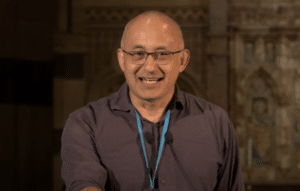
Dorothy A. Lee
15 May 2024
One of the features of the Anglican tradition is its strong commitment to daily prayer within the life of the church. The Book of Common Prayer, as it developed in the 16th century, provided Christians with an order for Daily Morning Prayer and Daily Evening Prayer throughout the year. These “offices” (that is, orders of service) were intended to be said in community in the local church: not alone, but with others. The very title makes this intention clear; it is common prayer, prayer for everyone, and not just the clergy.
So why this Anglican emphasis on praying together daily with the whole Christian community? The practice goes back to the New Testament and the gathering together of Christians as often as possible to pray, praise and give thanks together, and to intercede for the needy. Ephesians speaks of Christians being filled with the Spirit: “as you sing psalms and hymns and spiritual songs to one another, singing and making melody to the Lord in your hearts, giving thanks to God the Father at all times and for everything in the name of our Lord Jesus Christ” (5:18-20).
Read more: ‘Let us pray fervently for God to move powerfully in our city’
The early church developed a rhythm and pattern of daily prayer based on the earliest New Testament communities which continued into the Middle Ages. It became particularly a feature of monastic communities who prayed eight times throughout the 24-hour day. Their community life indeed was shaped primarily around prayer, along with common daily labour and the ministry of hospitality. The office as it developed was built around the Psalms and the reading of Scripture, as well as thanksgiving and intercession.
Anglicanism reshaped this tradition to become more focused on the local parish: a form of prayer that would fit into the pattern of lay people’s lives, at the beginning and end of each working day. Once again, as with the medieval church, it was patterned around the Psalms which played centre stage.
With the sense of a rediscovery of biblical faith, Anglican reformers wanted ordinary Christians to know their Bibles and included significant daily readings from the Old and New Testaments in the lectionary cycle. The ideal was that the whole Bible be heard in three years — a significant achievement, given that most people in that context were illiterate. The daily offices were the way the ordinary people heard and knew the Bible, really for the first time. The use of the lectionary ensured that the whole of Scripture was read in an orderly cycle.
Read more: ‘I hope that you receive the Lord’s Prayer for the gift it is and pray it daily’
The Lord’s Prayer was included in the BCP office because it is by definition a communal prayer (Our Father) and a daily prayer (give us today our daily bread). The office also incorporated special prayers and canticles, songs of praise from the Bible or the tradition, the most important of these being the Benedictus (Song of Zechariah) in morning prayer and the Magnificat (Song of Mary) in the evening. The morning and evening office in BCP was unchanging from day to day, so that people could say it by heart and allow it to seep down into their innermost being.
In our Prayer Book for Australia we now have a modern-language version of BCP’s original morning and evening prayer service and a more varied series of offices for each day of the week, morning and evening. We also have a short office for the end of the day (Compline). These, like all the traditional Christian offices, are based around the Psalms and a cycle of Bible readings for each day, including the Lord’s Prayer. It includes the opportunity for open prayer relevant to the specific context.
Praying together the daily office is vital for the health of our church as we move into the future. It offers us a way to gather in community outside the Sunday services, and it gives a structure to our prayer that is grounded on theological principles that derive from Scripture, not on personal whim or feeling. We don’t pray only when and as we feel. Prayer is a duty as well as a delight. We’re called to give thanks, to praise, to intercede, and we do this best in company with others, whether we feel like it or not. Saying the daily office together opens us to the gift of God’s presence and can renew us when we feel low and disheartened or disinclined to pray.
Read more: Sydney Christians offer prayers, in confusion and distress
COVID has admittedly struck a blow to our gathering together in the church. Now is the time to revive this ancient and biblical practice. At their ordination, all Anglican clergy commit to saying morning and evening prayer each day. Even if the clergy are sometimes on their own or with only one or two others, people know this public worship is ongoing, available when they can come. They know that they are being upheld daily in prayer before God.
Worship lies at the heart of our life as disciples of Jesus Christ and worship belongs primarily in community, in communion with one another. Such prayer forms the basis for our God-given work in the world: service, mission and evangelism. Praying together empowers and inspires us, nourishing us when we’re depleted and worn down by the daily struggles of living.
Much has been rightly said about the need for renewal in our church and the reviving of church leaders, so often wearied by the increasing demands of ministry. Praying the daily office together offers us the chance to allow God’s word to renew and revive us, clergy and laity. It reminds us that our ministry is not primarily our own but rather that of Christ whose mercy for us and for the world never fails.
Let us recommit ourselves as a church – across the spectrum of theological and liturgical viewpoints – to pray together each day in our place of ministry, putting our hope on the Lord who draws us into life and refreshes us before sending us out on the mission of the Triune God.
The Reverend Professor Dorothy A. Lee AM FAHA is Stewart Research Professor of New Testament at Trinity College Theological School and Associate Priest at St Paul’s Cathedral.
For more faith news, follow The Melbourne Anglican on Facebook, Instagram, or subscribe to our weekly emails.






